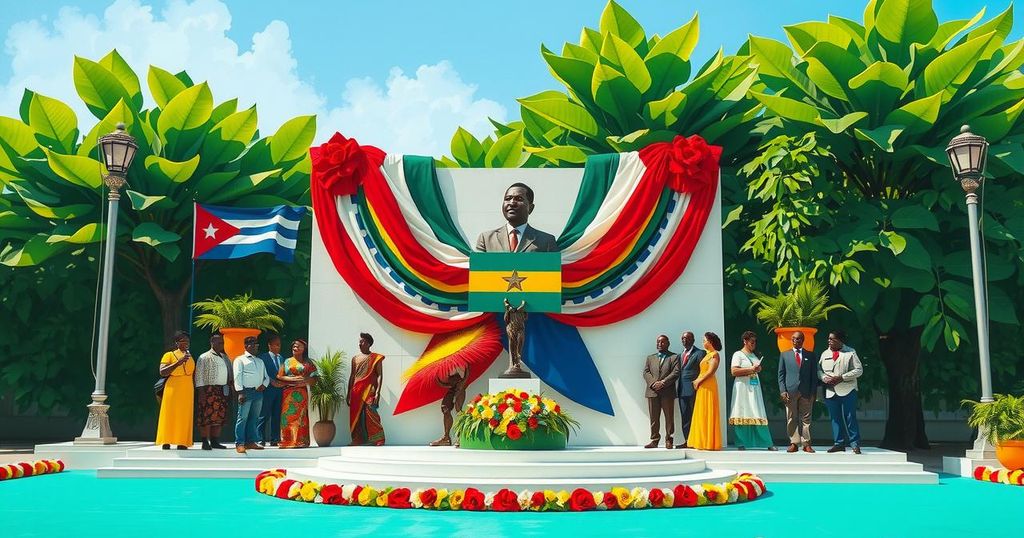Global news
In memoriam
AFRICA, BRUNO RODRÍGUEZ PARRILLA, CELEBRATION, COMMUNIST PARTY OF CUBA, CUBA, CUBAN WOMEN ' S FEDERATION, ELAM, FIDEL, FIDEL CASTRO RUZ, FOREIGN AFFAIRS, HAVANA, HERITAGE PRESERVATION, HISTORY, JOSE MARTI MEMORIAL, NORTH AMERICA, OBITUARY, POLITICAL BUREAU OF THE CENTRAL COMMITTEE OF THE COMMUNIST PARTY OF CUBA, REPUBLIC OF CONGO, U.S.-CUBA RELATIONS, VALDES MESA
Leila Ramsay
0 Comments
Cuba Honors Africa Day With Ceremony Reflecting Historical Ties
Cuba commemorated Africa Day on May 25 at the Jose Marti Memorial, led by prominent Cuban officials including Vice President Salvador Valdes Mesa. The ceremony focused on historical ties with Africa, emphasizing solidarity against colonialism and ongoing collaboration, particularly in healthcare education. The event highlighted Cuba’s commitment to Africa’s struggles for dignity and development.
In Havana, Cuba, a significant observance took place on Monday, May 27, as authorities commemorated Africa Day at the Jose Marti Memorial. This ceremony recognized the key date of May 25, which honors the rich heritage and diverse culture of Africa. Key figures included members from the Political Bureau of the Central Committee of the Communist Party of Cuba, notably Vice President Salvador Valdes Mesa, Foreign Minister Bruno Rodriguez Parrilla, and Teresa Amarelle Boue, the secretary general of the Cuban Women’s Federation. Also present was Rosalie Kama Niamayoua, the ambassador from the Republic of Congo and dean of the African Diplomatic Group in Cuba.
During his address, Valdes Mesa articulated the importance of the day, expressing that Cuba feels proud to celebrate various anniversaries linked to the establishment of diplomatic relations with several African countries. He pointed out how this observance is a vital part of acknowledging Cuba’s historical ties to African roots, emphasizing the long-standing connection in the shared struggles for sovereignty, independence, and the battles against colonial powers.
He poignantly noted that the fraternity Cuba shares with Africa developed through joint resistance against colonialism, racism, and apartheid, largely inspired by the influential figure of Commander in Chief Fidel Castro Ruz. He described these bonds as unbreakable, rooted deeply in the sacrifice of those who fought side-by-side for dignity.
Valdes Mesa also took the opportunity to remember the resilience of enslaved individuals who fought back from sugar mills and the maroons living freely in their palenques. He honored the contributions of those with African descent who combated against Spanish colonial rule. As the conversation shifted to the current global health landscape, he reaffirmed Cuba’s dedication to international medical cooperation, emphasizing that over 27 countries on the continent benefit from Cuban medical expertise, with more than 10,000 medical graduates from the Latin American School of Medicine.
Niamayoua highlighted Cuba’s unwavering support of Africa’s struggles and the continued influence of Fidel’s humanistic ideals in multiple countries within Africa. She pointed out how Cuba strongly aligns itself with continental priorities in significant international dialogues addressing major global challenges, underscoring a commitment to collaborative and sustainable development.
Africa Day, observed annually on May 25, serves as a moment for global reflection on the continent’s rich cultural diversity and its ongoing quest for unity and prosperity, transcending geographical boundaries. It is, as stated in the speeches, a reminder of both the challenges faced and the enduring spirit of collaboration among nations.
The celebration of Africa Day in Cuba underscored the deep-rooted historical and cultural ties between Cuba and Africa. Cuban leaders reaffirmed the nation’s commitment to support African struggles for dignity and independence, while also emphasizing ongoing collaborative efforts in medical education. This observance not only recognized past sacrifices but also highlighted current alliances characterized by mutual respect and sustainable development. Every year, May 25 is a time for the world to unite and celebrate the resilience and diversity of the African continent.
Original Source: www.cubanews.acn.cu




Post Comment